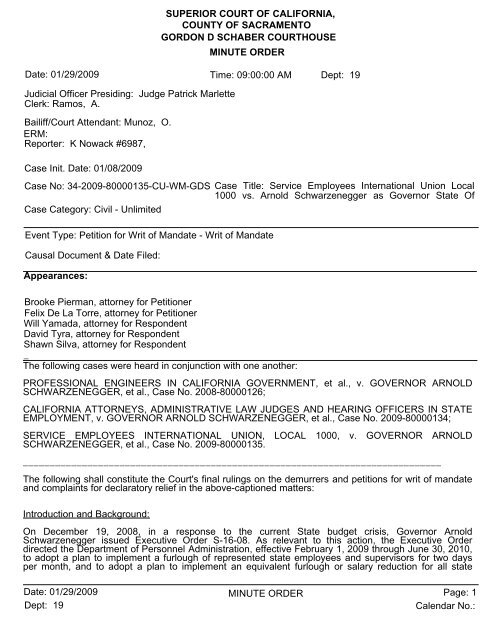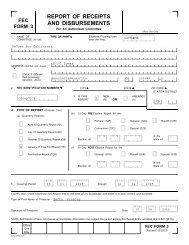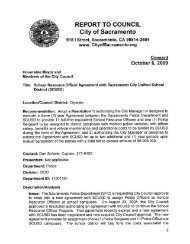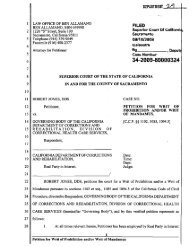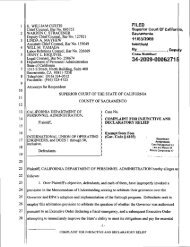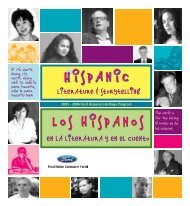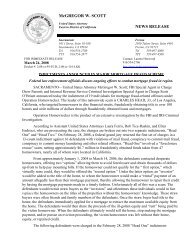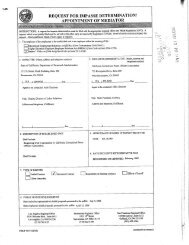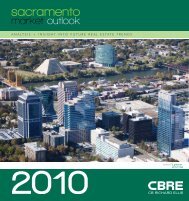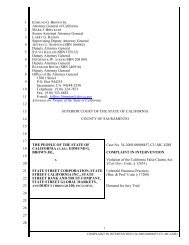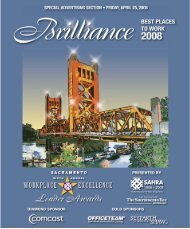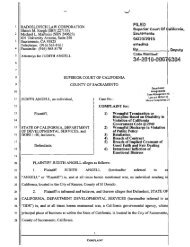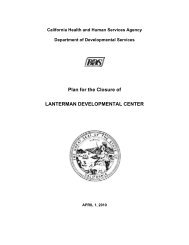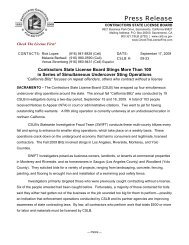MINUTE ORDER SUPERIOR COURT OF CALIFORNIA ...
MINUTE ORDER SUPERIOR COURT OF CALIFORNIA ...
MINUTE ORDER SUPERIOR COURT OF CALIFORNIA ...
You also want an ePaper? Increase the reach of your titles
YUMPU automatically turns print PDFs into web optimized ePapers that Google loves.
<strong>SUPERIOR</strong> <strong>COURT</strong> <strong>OF</strong> <strong>CALIFORNIA</strong>,<br />
COUNTY <strong>OF</strong> SACRAMENTO<br />
GORDON D SCHABER <strong>COURT</strong>HOUSE<br />
<strong>MINUTE</strong> <strong>ORDER</strong><br />
Date: 01/29/2009 Time: 09:00:00 AM Dept: 19<br />
Judicial Officer Presiding: Judge Patrick Marlette<br />
Clerk: Ramos, A.<br />
Bailiff/Court Attendant: Munoz, O.<br />
ERM:<br />
Reporter: K Nowack #6987,<br />
Case Init. Date: 01/08/2009<br />
Case No: 34-2009-80000135-CU-WM-GDS<br />
Case Category: Civil - Unlimited<br />
Event Type: Petition for Writ of Mandate - Writ of Mandate<br />
Causal Document & Date Filed:<br />
Appearances:<br />
Brooke Pierman, attorney for Petitioner<br />
Felix De La Torre, attorney for Petitioner<br />
Will Yamada, attorney for Respondent<br />
David Tyra, attorney for Respondent<br />
Shawn Silva, attorney for Respondent<br />
_<br />
The following cases were heard in conjunction with one another:<br />
Case Title: Service Employees International Union Local<br />
1000 vs. Arnold Schwarzenegger as Governor State Of<br />
PR<strong>OF</strong>ESSIONAL ENGINEERS IN <strong>CALIFORNIA</strong> GOVERNMENT, et al., v. GOVERNOR ARNOLD<br />
SCHWARZENEGGER, et al., Case No. 2008-80000126;<br />
<strong>CALIFORNIA</strong> ATTORNEYS, ADMINISTRATIVE LAW JUDGES AND HEARING <strong>OF</strong>FICERS IN STATE<br />
EMPLOYMENT, v. GOVERNOR ARNOLD SCHWARZENEGGER, et al., Case No. 2009-80000134;<br />
SERVICE EMPLOYEES INTERNATIONAL UNION, LOCAL 1000, v. GOVERNOR ARNOLD<br />
SCHWARZENEGGER, et al., Case No. 2009-80000135.<br />
______________________________________________________________________________<br />
The following shall constitute the Court's final rulings on the demurrers and petitions for writ of mandate<br />
and complaints for declaratory relief in the above-captioned matters:<br />
Introduction and Background:<br />
On December 19, 2008, in a response to the current State budget crisis, Governor Arnold<br />
Schwarzenegger issued Executive Order S-16-08. As relevant to this action, the Executive Order<br />
directed the Department of Personnel Administration, effective February 1, 2009 through June 30, 2010,<br />
to adopt a plan to implement a furlough of represented state employees and supervisors for two days<br />
per month, and to adopt a plan to implement an equivalent furlough or salary reduction for all state<br />
Date: 01/29/2009 <strong>MINUTE</strong> <strong>ORDER</strong><br />
Page: 1<br />
Dept: 19<br />
Calendar No.:
Case Title: Service Employees International Union Local<br />
1000 vs. Arnold Schwarzenegger as Governor State Of<br />
Case No: 34-2009-80000135-CU-WM-GDS<br />
managers, including exempt state employees.<br />
Several organizations representing state employees affected by the Executive Order have filed three<br />
separate petitions for writ of mandate and complaints for declaratory relief challenging the provisions of<br />
the Order imposing the furloughs, and seeking to overturn them.<br />
The first such action, Case No. 2008-80000126, was filed by petitioners Professional Engineers in<br />
California Government ("PECG") and California Association of Professional Scientists ("CAPS") on<br />
December 22, 2008. That action initially was assigned to Department 33 of this Court, Judge Lloyd<br />
Connelly, presiding; it was reassigned to this Department after respondents filed a peremptory challenge<br />
to Judge Connelly pursuant to Code of Civil Procedure section 170.6 on January 7, 2009.<br />
The second such action, Case No. 2009-80000134, was filed by petitioner California Attorneys,<br />
Administrative Law Judges and Hearing Officers in State Employment ("CASE") on January 5, 2009.<br />
That action was assigned to Department 33 of this Court, Judge Lloyd Connelly, presiding. Petitioner<br />
simultaneously filed a Notice of Related Case in that action, stating that it was related to Case No.<br />
2008-80000126.<br />
The third such action, Case No. 2009-80000135, was filed by petitioner Service Employees International<br />
Union, Local 1000 ("SEIU"), on January 7, 2009. The action was assigned to Department 29 of this<br />
Court, Judge Timothy M. Frawley, presiding. Petitioner simultaneously filed a Notice of Related Case in<br />
that action, stating that it was related to Cases Nos. 2008-80000126 and 2008-80000134<br />
On January 9, 2009, the Court heard simultaneous ex parte applications by the petitioners and<br />
respondents in Case No. 2008-80000126 for orders shortening time that would have the effect of setting<br />
a hearing on respondents' demurrer to the petition and the hearing on the merits of the petition itself for<br />
a date prior to February 1, 2009, when the furloughs would go into effect.<br />
At the hearing on January 9, 2009, counsel for the petitioners in Cases Nos. 2009-80000134 and<br />
2009-80000135 appeared and stipulated on the record that those cases would be treated as related to<br />
Case No. 2008-80000126, and that those cases would be transferred to this Department for hearing<br />
pursuant to Rule of Court 3.300(h)(1)(a). Counsel for respondents in Case No. 2008-80000126 also<br />
stated on the record that he represented the respondents in one of the other two cases, and most likely<br />
would represent the respondents in the other (although at that time, the petition had not formally been<br />
served on the respondents), and also stipulated on the record that the three cases would be heard in<br />
this Department as provided above. The parties further agreed to a briefing schedule and to a combined<br />
hearing on the respondents' demurrers to, and the merits of, the three petitions. The parties to all three<br />
actions have filed their briefs and other papers according to the agreed-upon schedule and the Court<br />
heard oral argument on the matter on Thursday, January 29, 2009.<br />
On January 12, 2009, a fourth action was filed challenging the Governor's Executive Order, entitled<br />
California Correctional Peace Officers Association v. Governor Arnold Schwarzenegger, et al., Case No.<br />
2008-80000137. The Court issued an order finding that case to be related to the three cases captioned<br />
above and further ordered that case assigned to this Department. That case has been set for hearing on<br />
Friday, February 5, 2009.<br />
Ruling on Preliminary Evidentiary Issues:<br />
Respondents have made two requests for judicial notice, filed January 9, 2009 and January 13, 2009,<br />
along with an Amended Request for Judicial Notice on January 23, 2009 in response to the Court's order<br />
directing them to submit complete copies of the Memoranda of Understanding ("MOUs") involved in<br />
these actions. No objections to the requests have been filed. The Court has reviewed the requests and<br />
the documents attached thereto and finds that all such documents are proper subjects for judicial notice.<br />
Respondents' requests for judicial notice are therefore granted.<br />
Respondents' evidentiary objection to the Declaration of Peter Flores, Jr. is overruled on the ground that<br />
the lack of a signature on the declaration has been remedied by the filing of an amended declaration,<br />
unchanged in substance, which bears Mr. Flores' signature.<br />
Date: 01/29/2009 <strong>MINUTE</strong> <strong>ORDER</strong><br />
Page: 2<br />
Dept: 19<br />
Calendar No.:
Case Title: Service Employees International Union Local<br />
1000 vs. Arnold Schwarzenegger as Governor State Of<br />
Case No: 34-2009-80000135-CU-WM-GDS<br />
Ruling on Respondents' Demurrers to the Petitions:<br />
Respondents' demurrers are overruled on the following basis:<br />
The petitions and complaints allege generally that the provisions of the Governor's Executive Order<br />
S-16-08 that implement a furlough of represented state employees and supervisors for two days per<br />
month, and an equivalent furlough or salary reduction for state managers, effective February 1, 2009<br />
through June 30, 2010, are invalid in that such action on the part of the Governor is not authorized by<br />
law, and moreover is forbidden by certain provisions of law, in particular, Government Code section<br />
19826(b).<br />
The Court finds that such allegations are sufficient to state a cause of action for issuance of a writ of<br />
mandate or for declaratory relief, regardless of whether Government Code section 19826(b) is<br />
superseded by the terms of the MOUs petitioners have entered into with the State (as respondents<br />
argue), because the petitions and complaints allege, in essence, that the Governor lacks the positive<br />
authority to make the challenged order in the first instance, irrespective of any statutory prohibition that<br />
may or may not apply. The allegation that the Governor lacks any authority to make the challenged order<br />
is sufficient to state a cause of action on its own.<br />
The Court further finds that the issue of the Governor's authority to make the challenged order is not an<br />
issue within the exclusive initial jurisdiction of the Public Employment Relations Board, because it<br />
involves issues of statutory interpretation and separation of powers between the Governor and the<br />
Legislature, which are matters properly within the jurisdiction of the courts, and not issues of unfair<br />
practices under the Ralph C. Dills Act, which are matters properly within the jurisdiction of the Board.<br />
(See, e.g., California School Employees Association v. Azusa Unified School District (1984) 152 Cal.<br />
App. 3rd 580, 592-593; California Teachers' Association v. Livingston School District (1990) 219 Cal.<br />
App. 3rd 1503, 1519.) Moreover, the petitions and complaints in effect allege that the Governor's<br />
Executive Order regarding an employee furlough violates the provisions of the petitioners' MOUs with<br />
the State governing wages and hours. The Board does not have the authority to enforce agreements<br />
between the parties. (Government Code section 3514.5(b); see also, San Lorenzo Education<br />
Association v. Wilson (1982) 32 Cal. 3rd 841.)<br />
Moreover, even if this Court were to conclude that the Board did have jurisdiction over this matter, it<br />
would conclude that the normal policy reasons requiring parties to exhaust available administrative<br />
remedies do not apply in this case for many of the reasons stated by the Third District Court of Appeal in<br />
a case arising out of an earlier state budget crisis: namely, that the facts are undisputed, so there is no<br />
need for administrative development of the record; judicial intervention will not interfere with the<br />
expertise of the agency or create problems of judicial economy, given that the underlying issues are<br />
within the expertise of the courts and undoubtedly would be resolved ultimately by the courts even if<br />
initial jurisdiction were found in the Board; and, given that this case raises questions of first impression<br />
which most likely are bound for ultimate determination in the appellate courts, there is little concern of<br />
conflicting decisions between the Board and the courts. (See, Department of Personnel Administration v.<br />
Superior Court (Greene) (1992) 5 Cal. App. 4th 155, 168-169.)<br />
______________________________<br />
In using the terms "respondents" or "defendants" in this ruling, the Court is referring to Governor Arnold Schwarzenegger and<br />
the Department of Personnel Administration. Although State Controller John Chiang also has been named as a respondent in<br />
these actions, the Controller has filed an Opposition to the Respondents'/Defendants' Demurrer stating that his interests are<br />
actually aligned with the petitioners and that, but for the short time frame, he would have filed a formal motion to realign the<br />
parties, seeking to be redesignated as a petitioner/plaintiff. The Controller's position in these actions will be discussed further<br />
below. In this ruling, the Court also has treated the terms "the Governor", "the Department of Personnel Administration" (or<br />
"the department" or "DPA") and "the State" as being essentially interchangeable.<br />
In addition, even if this Court were to conclude that the Board did have jurisdiction over this matter, it<br />
Date: 01/29/2009 <strong>MINUTE</strong> <strong>ORDER</strong><br />
Page: 3<br />
Dept: 19<br />
Calendar No.:
Case Title: Service Employees International Union Local<br />
1000 vs. Arnold Schwarzenegger as Governor State Of<br />
Case No: 34-2009-80000135-CU-WM-GDS<br />
would conclude that exhaustion of administrative remedies by resort to the Board should be excused on<br />
the ground that requiring exhaustion under the particular circumstances of this case would cause both<br />
the State and its employees to suffer irreparable injury, again, for many of the reasons stated in the 1992<br />
Greene case: specifically, that the extremely grave nature of the fiscal crisis faced by the state, and the<br />
urgent need for resolution of these issues in as expeditious a manner as possible, create a great<br />
potential for irreparable harm in the nature of layoffs of state employees, with a concomitant reduction in<br />
the nature of state services, all of which are amply demonstrated by the declarations and documents<br />
that have been filed by parties in this matter (many of them by respondents). Even if, as the Court of<br />
Appeal stated in the Greene case, there is a possibility that the Board could order the same relief that<br />
petitioners seek here, it is extremely unlikely that the entire process of Board adjudication followed by<br />
judicial review as provided by law would be completed in a sufficiently timely manner to address the<br />
immediate crisis. (See, Department of Personnel Administration v. Superior Court (Greene) (1992) 5<br />
Cal. App. 4th 155, 170-171.)<br />
Petitioners SEIU and CASE raise additional claims for declaratory relief regarding the effect of the<br />
furlough on the exempt status of employees under the federal Fair Labor Standards Act ("FLSA"). The<br />
SEIU complaint alleges that a significant number of its employees will be required to work in excess of<br />
40 hours during furlough weeks, that such employees will no longer be considered exempt employees<br />
as a matter of law during those weeks, that such workers will be entitled to overtime pay during such<br />
weeks, and that respondents lack any mechanism or systems in place to move employees from exempt<br />
to non-exempt status from week-to-week, with the result being that such employees will not receive the<br />
overtime pay to which they are entitled under the FLSA. Such facts are sufficient to state a cause of<br />
action in declaratory relief based on the theory that respondents are not willing and able to comply with<br />
their obligations under the FLSA, at least for the purpose of withstanding a demurrer. Respondents'<br />
contention that the complaint on its face shows that petitioner's FLSA claim is not ripe for review, and<br />
seeks only an advisory opinion, because there is no allegation that respondents actually have failed to<br />
pay any overtime that is due, is unpersuasive.<br />
The CASE complaint alleges the same facts regarding the effect of the furloughs on its employees'<br />
exempt status under the FLSA. The complaint lacks the specific allegations present in the SEIU<br />
complaint regarding respondents' lack of willingness and ability to comply with the FLSA, but alleges in<br />
general terms that respondents' actions will result in denial of the protection of the laws regarding<br />
overtime compensation. In essence, this complaint is identical in substance to the SEIU complaint; the<br />
Court concludes that it also states a cause of action for declaratory relief.<br />
Respondents' demurrers are therefore overruled.<br />
Ruling on the Petitions and Complaints:<br />
The petitions for writ of mandate and complaints for declaratory relief challenging the provisions of the<br />
Governor's Executive Order imposing furloughs on state employees are based on twin contentions: that<br />
the Governor lacks any authority, statutory or otherwise, to take such action; and that applicable<br />
statutory law expressly forbids him from taking such action. For the reasons stated below, the Court<br />
finds that these contentions are unpersuasive.<br />
The facts regarding the implementation of the furlough are essentially undisputed, as is the fact that the<br />
State faces an extremely urgent fiscal crisis. According to documents submitted to the Court, the<br />
Governor, through the Department of Personnel Administration, has developed a furlough plan that will<br />
result in the closing of general government operations on the first and third Fridays of each month,<br />
beginning on Friday, February 6, 2009. The unpaid furlough days are not work days and employees<br />
shall not report to work. For state operations that cannot close, a "self-directed" furlough will be used that<br />
will result in state employees either taking two furlough days each month on days chosen by the<br />
employees and approved by their supervisors, or accruing two furlough days per month to be taken<br />
when feasible. Salaries will be adjusted to reflect the unpaid furlough days, but benefits will remain the<br />
same.<br />
______________________________<br />
This is, of course, distinct from the issue of whether there is any proof tending to demonstrate that FLSA violations actually<br />
will occur. This issue is dealt with in the Court's ruling on the merits, below.<br />
There do appear to be disputes of fact over whether the implementation of the furlough will result in violations of the federal<br />
FLSA. This issue will be discussed separately below.<br />
Date: 01/29/2009 <strong>MINUTE</strong> <strong>ORDER</strong><br />
Page: 4<br />
Dept: 19<br />
Calendar No.:
Case Title: Service Employees International Union Local<br />
1000 vs. Arnold Schwarzenegger as Governor State Of<br />
Case No: 34-2009-80000135-CU-WM-GDS<br />
The Governor's Executive Order thus reduces the normal work hours of state employees for a temporary<br />
period due to the state's current fiscal crisis. The emergency measure will result in an accompanying<br />
deduction from pay for the hours not worked, but the order does not change established salary ranges.<br />
The Governor's authority for this action is found in statutes in the Government Code and in the<br />
employment contracts of the unions challenging the order.<br />
The Governor has the statutory authority to reduce the hours of state employees pursuant to<br />
Government Code section 19851 and 19849.<br />
Section 19851(a) provides: "It is the policy of the state that the workweek of the state employee shall be<br />
40 hours, and the workday of the state employee eight hours, except that workweeks and workdays of a<br />
different number of hours may be established in order to meet the varying needs of the different state<br />
agencies."<br />
Section 19849(a) provides that the Department of Personnel Administration "...shall adopt rules<br />
governing hours of work and overtime compensation and the keeping of records related thereto,<br />
including time and attendance records. Each appointing power shall administer and enforce such rules."<br />
The Court finds that these two statutes, taken together, provide the Governor with authority to reduce<br />
the workweek of state employees to meet the needs of state agencies, and to do so by adopting a rule.<br />
The provisions of the Executive Order regarding the furlough are a rule in that they establish a standard<br />
of general application to state employees. Under the circumstances of the current fiscal crisis, the<br />
reduction in the workweek of state employees under the furlough order is indisputably related to the<br />
needs of the various state agencies, which, from the evidence respondents have submitted to the Court,<br />
run the imminent risk of running out of money and thus being unable to carry out their missions, if<br />
immediate action is not taken to reduce expenditures.<br />
The Court further finds, on two separate bases, that the Governor has authority to reduce the work hours<br />
of the state employees represented by the petitioners in these actions pursuant to the terms of the<br />
MOUs the State entered into with the petitioner employee organizations, which remain in effect, although<br />
technically expired, pursuant to Government Code section 3517.8(a).<br />
________________________________<br />
See, Memorandum dated January 9, 2009 from David A. Gilb, Director of the Department of Personnel Administration, to<br />
Agency Secretaries, et al., regarding "State Employee Furlough per Governor's Executive Order S-16-08", attached to the<br />
Amended Declaration of Peter Flores, Jr. as Exhibit H.<br />
See, Respondents' Request for Judicial Notice, filed January 9, 2009, Exhibit A, p. 80 (PECG MOU); Exhibit B, p. 75 (CAPS<br />
MOU); Respondents' Amended Request for Judicial Notice, filed January 23, 2009, Exhibit A, p. 16 (CASE MOU); Exhibit B,<br />
p. 20 (SEIU MOU for Bargaining Unit 1); Exhibit C, p. 22 (SEIU MOU for Bargaining Unit 3); Exhibit D, p. 21 (SEIU MOU for<br />
Bargaining Unit 4); Exhibit E, p. 21 (SEIU MOU for Bargaining Unit 11); Exhibit F, pp. 22-23 (SEIU MOU for Bargaining Unit<br />
14); Exhibit G, p. 21 (SEIU MOU for Bargaining Unit 15); Exhibit H, p. 21 (SEIU MOU for Bargaining Unit 17); Exhibit I, p. 21<br />
(SEIU MOU for Bargaining Unit 20); Exhibit J, p. 19 (SEIU MOU for Bargaining Unit 21). In addition, the PECG MOU<br />
provides, in Article 17.1, which appears under the heading "State Rights", that: "All the functions, rights, powers and authority<br />
not specifically abridged by this MOU are retained by the employer." (See, Respondents' Request for Judicial Notice, filed<br />
January 9, 2009, Exhibit A, p. 72.)<br />
See, respondents' Amended Request for Judicial Notice, filed January 23, 2009, Exhibit A, p. 11.<br />
See, Respondents' Amended Request for Judicial Notice, filed January 23, 2009, Exhibit A, p. 59.<br />
See, Respondents' Request for Judicial Notice, filed January 9, 2009, Exhibit B, p. 71.<br />
See, Respondents' Amended Request for Judicial Notice, filed January 23, 2009, Exhibit B, p. 16 (Bargaining Unit 1); Exhibit<br />
C, p. 17 (Bargaining Unit 3); Exhibit D, p. 17 (Bargaining Unit 4); Exhibit E, p. 17 (Bargaining Unit 11); Exhibit F, p. 18<br />
(Bargaining Unit 14); Exhibit G, p. 17 (Bargaining Unit 15); Exhibit H, p. 17 (Bargaining Unit 17); Exhibit I, p. 16 (Bargaining<br />
Unit 20); Exhibit J, p. 15 (Bargaining Unit 21).<br />
At oral argument on these matters, counsel for CASE and PECG argued that many of their members work in so-called<br />
"special fund" agencies, and that the Governor's order, which was designed to deal with a looming General Fund deficit, was<br />
not reasonably related to the fiscal emergency insofar as it orders furloughs for those employees. (CASE also raised this<br />
issue in its reply brief.) This contention was not raised in any of the petitions or complaints for declaratory relief, and<br />
petitioners did not submit any evidence to support it. The Court therefore makes no findings on it.<br />
Date: 01/29/2009 <strong>MINUTE</strong> <strong>ORDER</strong><br />
Page: 5<br />
Dept: 19<br />
Calendar No.:
Case Title: Service Employees International Union Local<br />
1000 vs. Arnold Schwarzenegger as Governor State Of<br />
Case No: 34-2009-80000135-CU-WM-GDS<br />
First, each of the petitioners' MOUs expressly incorporates the terms of sections 18949 and 19851 into<br />
the agreement between the parties , and the terms of the MOU do not conflict with these statutes,<br />
notwithstanding that the MOUs call for a normal work week of 40 hours. Thus, these provisions of law<br />
are not superseded by the MOUs, and the Governor retains the authority, pursuant to law and contract,<br />
to take any actions he would be permitted to take pursuant to Government Code sections 19849 and<br />
19851 as described above.<br />
Second, the specific terms of certain of the petitioners' MOUs expressly permit the State either to reduce<br />
hours in case of lack of funds or to take all necessary action to carry out its mission in emergencies.<br />
For example, Article 3.1.B of the MOU between the State and petitioner CASE, which appears under the<br />
heading "State Rights", provides that "[t]o the extent consistent with law and this MOU, the rights of the<br />
State include, but are not limited to, the exclusive right to...relieve its employees from duty because of<br />
lack of work, lack of funds, or for other legitimate reasons...[and to] take all necessary actions to carry<br />
out its mission in emergencies."<br />
Article 10.3 of the CASE MOU, which appears under the heading "Layoff", further provides: "The State<br />
may propose to reduce the number of hours an employee works as an alternative to layoff. Prior to<br />
implementation of this alternative to a layoff, the State will notify and meet and confer with the Union to<br />
seek concurrence of the usage of this alternative."<br />
Article 12.1.B of the CAPS MOU, which appears under the heading "State Rights", provides that:<br />
"Consistent with this Agreement, the rights of the State shall include, but not be limited to, the right...to<br />
take all necessary action to carry out its mission in emergencies."<br />
Article 4.B of each of the SEIU MOUs similarly provides that: "Consistent with this Contract, the rights of<br />
the State shall include, but not be limited to, the right...to take all necessary action to carry out its<br />
mission in emergencies."<br />
The Court finds that the current fiscal emergency, which is amply documented in the evidence<br />
respondents have submitted, authorizes the Governor to reduce the work hours of state employees<br />
under these cited terms of the various MOUs. The nature of the fiscal emergency is such that the state<br />
employee furloughs imposed by the Governor's Executive Order are both necessary and reasonable<br />
under the circumstances.<br />
The existence of the current emergency also authorized the Governor to make his order without first<br />
meeting and conferring with state employee organizations pursuant to Government Code section<br />
3516.5.<br />
The Court accordingly finds that both statutory law and the provisions of the petitioners' MOUs<br />
authorized the Governor to reduce the work hours of state employees through a furlough in the current<br />
fiscal emergency.<br />
The Court finds that Government Code section 19826(b) does not preclude the Governor from taking<br />
such action.<br />
Section 19826(b) states that the Department of Personnel Administration shall not establish, adjust or<br />
recommend a salary range for any employees in an appropriate unit where an employee organization<br />
has been chosen as the exclusive representative pursuant to Government Code section 3520.5, which is<br />
the case for all of the petitioners in these actions.<br />
This case, however, does not involve the establishment, adjustment or recommendation of a salary<br />
range for represented state employees. This case involves a temporary reduction in the hours worked by<br />
certain state employees, which will result in a loss of pay for the hours not worked. The order does not<br />
change established salary ranges at all: state employees will continue to receive their normal pay<br />
according to established ranges in weeks that do not include a furlough day. In essence, state<br />
employees are subject to a temporary deduction from their total pay under the established ranges, and<br />
not to being paid under a new or adjusted salary range.<br />
Date: 01/29/2009 <strong>MINUTE</strong> <strong>ORDER</strong><br />
Page: 6<br />
Dept: 19<br />
Calendar No.:
Case Title: Service Employees International Union Local<br />
1000 vs. Arnold Schwarzenegger as Governor State Of<br />
Case No: 34-2009-80000135-CU-WM-GDS<br />
The present case is therefore distinguishable from Department of Personnel Administration v. Superior<br />
Court (Greene) (1992) 5 Cal. App. 4th 155, which involved an across-the-board salary cut of 5% with no<br />
furlough or reduction in work hours. Greene also involved the issue of what the State was entitled to do<br />
in the bargaining process under the Ralph C. Dills Act, specifically, whether the State could unilaterally<br />
impose the salary cut as part of its "last, best and final offer" when it was officially at impasse with the<br />
state employee organizations. The present case does not involve bargaining issues in that the parties<br />
are not at impasse, and petitioners' pleadings have raised issues regarding the Governor's positive<br />
authority to make the challenged order rather than issues regarding any failure to comply with his<br />
collective bargaining obligations under the Dills Act.<br />
Moreover, the Greene case did not address any provisions of the employee organizations' MOUs that<br />
might have authorized the salary reduction in that case, on the basis of an emergency or otherwise,<br />
because the case technically involved a situation in which there was an absence of a MOU, as is the<br />
case when an existing MOU has expired and the parties have bargained to impasse. (See, Department<br />
of Personnel Administration v. Superior Court (Greene) (1992) 5 Cal. App. 4th 155, 174.) As noted<br />
above, the petitioners' MOUs in this case remain in effect pursuant to Government Code section<br />
3517.8(a), and contain provisions authorizing the Governor's order reducing work hours. The Greene<br />
case therefore is not controlling here.<br />
The Court accordingly rules that, with regard to the issues raised by all petitioners regarding the<br />
Governor's authority to make the challenged order, the petitions for writ of mandate are denied and<br />
judgment shall be entered for the defendants (respondents) on the complaints for declaratory relief. This<br />
ruling applies to both state employees represented by all of the petitioners under the Dills Act and to<br />
those state employees represented by petitioners PECG and CAPS who are excluded from the Dills Act<br />
by law, as the authorities on which the Court has relied in finding that the Governor has the authority to<br />
take the challenged action apply to both classes of employees.<br />
With regard to the causes of action for declaratory relief raised by SEIU and CASE raising issues<br />
involving possible non-compliance with the FLSA, the Court finds that as a matter of proof, as<br />
distinguished from a matter of pleading, petitioners' claims that implementation of the Governor's order<br />
will actually result in employees formerly considered to be exempt from the Act's provisions working<br />
overtime within the meaning of the Act during a furlough week, and that the State will not comply with the<br />
Act with regard to employees who do so, are entirely hypothetical and speculative prior to<br />
implementation of the furloughs, and thus not ripe for decision.<br />
As respondents point out, under applicable federal regulations, employees may be furloughed for<br />
budget-related reasons without affecting their exempt status, except for the workweek in which the<br />
furlough occurs. The viability of petitioners' FLSA claims therefore depends upon proof that there will be,<br />
as a matter of fact, employees who work more than 40 hours during a furlough week. At this point,<br />
before the furlough actually has been implemented, there is no evidence before the Court regarding any<br />
employee actually doing this, let alone any evidence that this will be the case with large numbers of state<br />
employees. Petitioners' allegations that this will happen are merely hypothetical.<br />
___________________________<br />
At oral argument, counsel for petitioner SEIU raised the contention that the Governor's order amounted to an unconstitutional<br />
impairment of contracts. This contention was not raised in any of the petitions, and was not briefed by the parties. Petitioner<br />
SEIU did cite several out-of-state cases in its reply brief in which government employee furloughs were challenged on this<br />
basis. Those cases were cited, however, for the proposition that a furlough is equivalent to a reduction in employee salary,<br />
and not in support of the contention that the Governor's action impaired the petitioner's contracts with the State. Because<br />
such contention was not raised by the petitions or briefed by the parties, the Court makes no finding on it.<br />
See, Title 29, Code of Federal Regulations, section 541.710.<br />
See, Declaration of Don Scheppmann, chief of Personnel/Payroll Services Division of the Office of the California State<br />
Controller, dated October 14, 2008 and filed in the case entitled David A. Gilb, California Department of Personnel<br />
Administration v. John Chiang, Office of State Controller, et al., which is pending in the United States District Court for the<br />
Eastern District of California, attached to CASE's opposition to respondents' demurrer as Exhibit A.<br />
See, e.g., 29 U.S.C. Section 216.<br />
Date: 01/29/2009 <strong>MINUTE</strong> <strong>ORDER</strong><br />
Page: 7<br />
Dept: 19<br />
Calendar No.:
Case Title: Service Employees International Union Local<br />
1000 vs. Arnold Schwarzenegger as Governor State Of<br />
Case No: 34-2009-80000135-CU-WM-GDS<br />
Similarly, the evidence that petitioner CASE has submitted demonstrating that the State's payroll system<br />
is antiquated and lacks the flexibility and reliability to be able to cope with the kind of week-to-week<br />
changes in an employee's exempt status that will occur when furloughs are implemented , is not<br />
necessarily proof that the State will not be able to cope with paying overtime pay to those to whom it is<br />
entitled. Once again, petitioners' proposition that the FLSA will be violated depends upon proof that<br />
employees actually will be entitled to overtime, and that there will be sufficient numbers of them that the<br />
State will not be able to comply with the FLSA. Such proof is lacking at this point.<br />
Finally, even if petitioners were able to prove that the State was likely to fail to comply with the FLSA<br />
with regard to some number of state employees, it would not necessarily follow that they would be<br />
entitled to the relief they seek, which is the invalidation of the furlough order itself. Any actual violation of<br />
the FLSA would give rise to remedies arising under the FLSA, i.e., for recovery of the unpaid overtime<br />
compensation , but the failure to comply with the FLSA in that situation would be a separate issue from<br />
the validity of the furlough. Notwithstanding this Court's ruling upholding the Governor's order, any<br />
affected employee retains his or her rights and remedies under FLSA, and the Court's ruling that<br />
petitioners have not proven an actual violation of the FLSA at this point does not preclude them, or their<br />
individual members, from exercising those remedies once an actual violation can be proven. Thus, FLSA<br />
compliance issues, hypothetical or otherwise, do not serve as a basis for overturning the Governor's<br />
Executive Order regarding furloughs.<br />
The Court therefore finds in favor of defendants (respondents) on the SEIU and CASE complaints for<br />
declaratory relief regarding alleged non-compliance with the FLSA.<br />
A final issue remains with regard to the State Controller. As noted in footnote 1 above, the Controller,<br />
although named as a respondent/defendant, has taken a position in these actions in alignment with the<br />
petitioners, specifically stating that his office "...has no intention of implementing the reduction in pay as<br />
contemplated in the Governor's Order, unless determined otherwise by a court of law." In Tirapelle v.<br />
Davis (1993) 20 Cal. App. 4th 1317, the Third District Court of Appeal held that the Controller may not<br />
refuse to implement an executive action affecting state employees' pay that is authorized by law. In this<br />
case, the Court has ruled that the provisions of the Governor's Executive Order reducing the work hours<br />
of state employees through a furlough, and thereby affecting their pay during the furlough weeks, is<br />
authorized by law. The Controller therefore lacks authority to refuse to implement the Governor's<br />
Executive Order. The Court's judgment in this matter therefore shall include an order directing the<br />
Controller to take all necessary and appropriate steps to implement the provisions of the Governor's<br />
Executive Order imposing furloughs on state employees, including the incidental reduction in such<br />
employees' pay.<br />
At the close of the hearing, counsel for CASE made an oral motion on the record that the Court stay its<br />
ruling pending appellate review. The Court denied the motion.<br />
Counsel for respondents is directed to prepare the orders and judgments in accordance with this ruling<br />
under the procedures set forth in Rule of Court 3.1312.<br />
__________________<br />
See, Controller's Opposition to Respondents' Demurrer, p. 2:15-17.<br />
Date: 01/29/2009 <strong>MINUTE</strong> <strong>ORDER</strong><br />
Page: 8<br />
Dept: 19<br />
Calendar No.:


